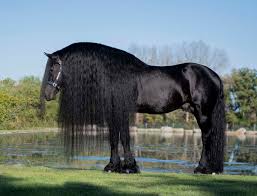
Friesian
Conditions of detention
Friesian horses are adaptable and can live in a variety of environments, but they thrive best in spacious settings where they can exercise freely. They require a stable or shelter that is large enough to accommodate their size, with ample ventilation to keep them comfortable.
Useful Fact: Friesians, with their long manes and tails, benefit from stables that reduce the risk of tangling and injuries to their luxurious hair.
Nutrition and diet
Friesians need a well-balanced diet that includes high-quality hay, grains, and necessary supplements to support their large, muscular bodies. They may also require additional calories if they are heavily worked or competing.
Useful Fact: Friesians are prone to metabolic issues, so it’s important to monitor their diet closely to avoid obesity and related health problems.
Health
Friesians are generally healthy but are susceptible to specific health issues such as colic, metabolic disorders, and a genetic condition known as dwarfism. Regular veterinary care, including dental check-ups and vaccinations, is essential to maintaining their health.
Useful Fact: Friesians are known for their “feathering” (the long hair on their lower legs), which requires careful management to prevent skin infections like scratches.
Grooming and care
Friesians require regular grooming to maintain their long, thick manes, tails, and feathering. Daily brushing and detangling are essential to prevent matting, and regular bathing can help keep their coat and skin in good condition.
Useful Fact: Using a detangler spray specifically designed for horses can make managing a Friesian’s long mane and tail much easier.
Education and training
Friesians are intelligent and willing learners, making them well-suited to various training disciplines, especially in dressage and driving. They respond well to positive reinforcement and consistent training.
Useful Fact: Due to their natural grace and balance, Friesians excel in classical dressage, where their impressive movement is highly valued.
Toys and entertainment
Friesians enjoy mental and physical stimulation. Toys like treat balls, traffic cones, and even exercise equipment like ground poles can be beneficial, particularly when they are not being ridden or worked.
Useful Fact: Providing mental challenges through toys or varied activities can help prevent boredom and associated behavioral problems in Friesians.
Safety
Given their size and strength, Friesians require strong, secure fencing to ensure their safety. Stables and paddocks should be spacious and free of hazards that could lead to injuries, especially to their legs and feathers.
Useful Fact: Friesians, due to their calm nature, are less likely to panic in unfamiliar situations, making them safer in various environments compared to more nervous breeds.
Accessories
Friesians often require specialized tack due to their size and unique build. This includes well-fitted saddles, bridles, and protective leg gear, especially if they are involved in dressage or driving.
Useful Fact: Custom-made or adjustable saddles are often necessary for Friesians to ensure a proper fit that accommodates their broad backs and deep chests.
Socialization
Friesians are social and enjoy interacting with other horses and humans. They thrive in environments where they can be part of a herd or have regular companionship, which is important for their emotional well-being.
Useful Fact: Friesians are known for forming strong bonds with their handlers and are often described as “people-oriented,” making them excellent companions.
Travel and Transportation
Friesians generally travel well, but due to their size, they require a spacious trailer for comfort during transport. It’s important to ensure that the trailer is well-ventilated and padded to prevent injuries during travel.
Useful Fact: When transporting a Friesian, extra care should be taken with their long feathers and manes to prevent them from getting caught or damaged.
Behavior and psychology
Friesians are known for their calm, gentle, and willing temperament. They are usually easy to handle and train, making them suitable for both experienced riders and those new to the breed.
Useful Fact: Friesians’ calm demeanor makes them excellent candidates for therapeutic riding programs, where their gentle nature and smooth gait are appreciated.
Legal aspects
Owning a Friesian horse may involve specific legal considerations, especially if they are used in breeding or competitive showing. Registration with the Friesch Paarden Stamboek (FPS) is necessary for breeding purposes, and compliance with animal welfare laws is essential.
Useful Fact: Friesian horses are often registered and tracked through their lineage to ensure the purity of the breed, which is highly valued by breeders and enthusiasts.


